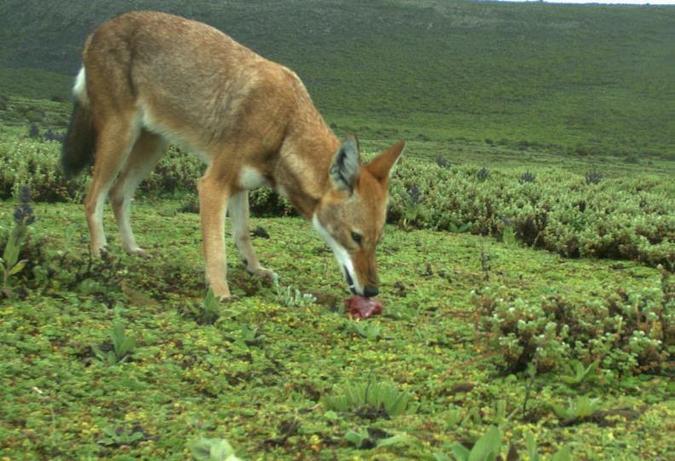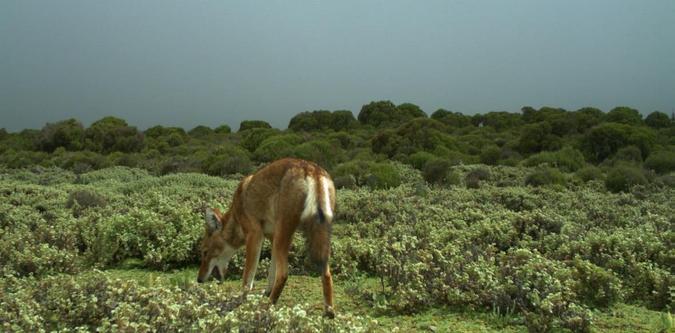
Press release by Ethiopian Wolf Conservation Programme
Over the past month, a team from the Ethiopian Wolf Conservation Programme (EWCP) implemented the first oral vaccination campaign to pre-empt outbreaks of rabies among Ethiopian wolves, the world’s most endangered canid, in their stronghold in the Bale Mountains of southern Ethiopia.
This is a turning point in the plight to save Ethiopian wolves from extinction, following a decade of intensive research, field trials and awareness work, led by the University of Oxford’s Wildlife Conservation Research Unit and funding from the Born Free Foundation among others. Working alongside the Ethiopian Wildlife Conservation Authority, regular oral vaccination campaigns will now expand to all six extant wolf populations to enhance their chance of survival.
There are fewer than 500 Ethiopian wolves in the world, all in the wild and highly exposed to infectious diseases transmitted by domestic dogs.
“Thirty years ago I witnessed an outbreak of rabies which killed the majority of the wolves I had followed closely for my doctoral studies,” said Prof Claudio Sillero, EWCP Director and Founder. “We have learnt much about these wolves and their Afroalpine homes since. By the time we detect rabies in a wolf population, already many animals are fatally infected and doomed. We now know that pre-emptive vaccination is necessary to save many wolves from a horrible death and to keep small and isolated populations outside the vortex of extinction. I whole-heartily celebrate the team’s achievement”.
Long-term programmes and targeted research are the cornerstones of biological conservation, as success often relays on an intimate knowledge of the workings of populations, the behaviour of individuals and the social, political and economic context. With a generous donation from Virbac of 3,000 SAG2 oral vaccines, EWCP has launched a vaccination strategy, guided by strong empirical information and predictive modelling, and a key component of the National Action Plan for the conservation of the species.

Muktar Abute, the EWCP vet team leader, described the vaccination plan : “Vaccine contained within a meat bait were distributed at night time to three Ethiopian wolf packs. Our target is to immunise at least 40% of all wolves in each population, reaching as many family packs as possible, including the dominant pair – on which pack stability largely depends. We recorded good uptake, with 88% of 119 baits deployed consumed over two nights. Using camera traps we monitored bait consumption, and we will next measure rabies titres levels in blood, to confirm the effectiveness of the vaccine over a larger sample than that of the trials”.
Oral vaccination using SAG2 has been successful in controlling, and even eradicating, rabies in wild carnivore populations in Europe. This approach now raises hopes for the survival of one of the rarest and most specialised carnivore species.
Preventive vaccination can improve the status of other threatened wildlife, and the Ethiopian wolf experience may lead to other practitioners to embrace it as part of their conservation tool kit, in a world demanding closer control of pathogens shared by wildlife, domestic animals and humans.
Watch a video below of a young Ethiopian wolf taking the bait
httpv://youtu.be/Ll2R5SSlWRg
RESOURCES
Elsevier. Sillero-Zubiri C, Marino J, Gordon CH, Bedin E, Hussein A, Regassa F, Banyard A and Fooks AR (2016): Feasibility and efficacy of oral rabies vaccine SAG2 in endangered Ethiopian wolves
Ethiopian Wildlife Conservation Authority (2017): National Action Plan for the conservation of the Ethiopian wolf (revised version 2017)
To comment on this story: Login (or sign up) to our app here - it's a troll-free safe place 🙂.![]()






